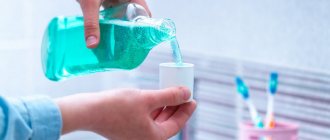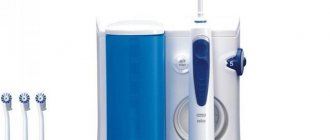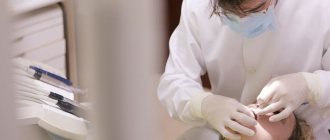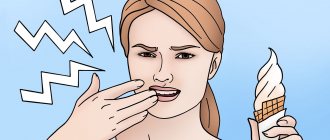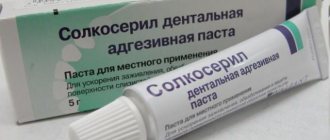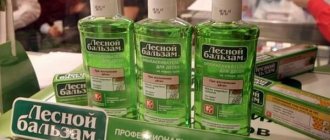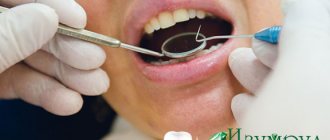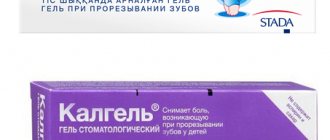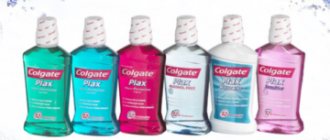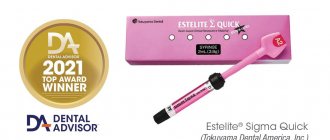Author of the article:
Soldatova Lyudmila Nikolaevna
Candidate of Medical Sciences, Professor of the Department of Clinical Dentistry of the St. Petersburg Medical and Social Institute, Chief Physician of the Alfa-Dent Dental Clinic, St. Petersburg
Oral hygiene is not only regular brushing of teeth in the morning and evening, but also the use of other means to remove bad breath and prevent dental diseases. One of these products is mouthwash. Previously, decoctions of medicinal plants were used in this capacity. Modern medicine offers complex, balanced compositions that have a targeted effect and provide the desired therapeutic or preventive effect.
Purpose of rinses for the mouth and gums
Dentists recommend using these products for:
- Keeping your breath fresh.
- For people who smoke, the components included in the product prevent yellowing of tooth enamel, and also reduce the destructive effect of nicotine and tar on tooth enamel.
- Reducing the effect of “staining” of the enamel as a result of frequent consumption of coffee, tea, wine and other drinks that affect the color of teeth.
- To reduce inflammation in the gums and reduce their bleeding.
- Reduced enamel sensitivity.
Also recommended for use:
- People who suffer from various oral diseases.
- Patients who have braces, dentures or any other structures in the oral cavity.
- After operations in the oral cavity (tooth extraction, installation of implants, etc.).
It must be taken into account that rinses are used as an aid to oral care. They should not be used as a substitute for brushing your teeth. The liquid product helps get rid of food particles and germs that cannot be removed during regular cleaning.
Teeth whitening rinses –
This is the last group of funds that we would like to talk about. The fact is that such rinses may contain not only completely harmless, but also quite dangerous components. For example, common “whitening components” include: 1) the enzymes bromelain and papain, which dissolve the protein matrix of plaque, 2) polyphosphates prevent plaque from adhering to the teeth - sodium hexametaphosphate and trisodium phosphate, 3) pyrophosphates and polydone prevent the mineralization of plaque, t .e. its transformation into tartar.
All these components are also found in toothpastes (in certain combinations). But what should never be in rinses is carbamide peroxide/hydrogen peroxide. For example, some ROCS rinses contain “hydrogen peroxide 1.0%” (hydrogen peroxide) to implement the oxygen bleaching mechanism. These components are widely used in professional products - in special whitening trays with gel, whitening strips, etc. But an important condition for use is that the gums are isolated from contact with the gel containing peroxide.
There is a clinical study (“The myth of oral hygiene using synthetic mouthwash products,” 2016). It clearly shows that even small concentrations of peroxides in mouth rinses can lead to mutations in the DNA of cells in the oral mucosa. Those. in this case, we are talking about the fact that such rinses increase the risk of developing cancer, and this risk will be highest in smokers. We hope that our review of mouthwashes was useful to you!
Sources:
1. Dental education of the author of the article, 2. National Library of Medicine (USA), 3. PubMed.gov scientific research database, 4. Official websites of manufacturers of oral hygiene products.
Composition of funds
The composition may include the following main components:
- Substances aimed at eliminating the risk of inflammation (antiseptics). These include: triclosan, chlorhexidine
- Fluorine compounds (sodium fluoride, etc.)
- Extracts from plants (extracts)
- Xylitol
- Ethanol
The components contained in each product may differ depending on the purpose for which a particular mouthwash is made. Ethyl alcohol is practically not used in modern rinses, since it can dry out the oral cavity.
Functions
Modern rinses perform several functions simultaneously:
- clean the oral cavity of food particles and harmful bacteria (especially important when wearing braces);
- freshen breath for a long time, since the deodorizing properties of mouth rinses are more stable than those of toothpastes;
- support oral health;
- have a whitening effect (relevant for certain types of rinses).
Find out more in the article “Why do you need a rinse aid?”
Up to contents
Classification
The classification divides mouth products into two main groups:
- hygienic (cosmetic) - in fact, only masking the problem;
- medicinal - really eliminating it.
Hygienic ones include deodorizing mouth rinses - refreshing, eliminating unpleasant odor, and whitening - brightening tooth enamel.
Therapeutic rinses can be divided into:
- anti-caries;
- painkillers (anti-inflammatory);
- antibacterial;
- against gingivitis and plaque;
- against tartar;
- astringents.
Anti-caries products usually contain a lot of fluoride, which strengthens teeth well. They are often prescribed to those who wear braces.
Pain-relieving mouth rinses are designed to relieve acute pain associated with certain oral diseases. You can buy mouthwashes with this effect in pharmacies.
Antibacterial rinses destroy harmful microorganisms and keep gums healthy; they usually have a complex synthetic composition.
Rinses that are designed to prevent gingivitis and plaque act on bacteria, slowing their growth in the mouth. If the product contains antiseptics, for example, triclosan, then it is used only with a prescription.
Anti-tartar products contain calcium citrate.
Astringents constrict blood vessels, thereby reducing their sensitivity, and form a film on nerve endings, protecting them from inflammation.
Beneficial properties of mouth rinse
The use of a rinse is recommended for all people, even those with absolutely healthy teeth. Useful properties of the rinse aid:
- cleansing the surface of the teeth from plaque, which begins to form almost immediately after classical brushing with a toothbrush;
- protection against caries, help for sensitive teeth;
- elimination of unpleasant odor (its source is most often dental plaque);
- antibacterial effect of mouth rinse (prescribed after dental surgery to prevent infection);
- prevention of the formation of tartar, dissolution of the initial formations of hard plaque.
Even the most thorough brushing of your teeth with the right brush and the perfect toothpaste will not help get rid of the amount of bacteria that the mouthwash destroys.
How to use it correctly?
Recommendations for using the product:
- The amount of product must correspond to the recommended amount. Information on the required dosage can be found in the package insert or on the cap of the rinse aid. Some manufacturers of products provide special dispensers that do not allow the use of liquid in excess of the norm.
- The product must be diluted if this is stated in the instructions.
- Mouthwash is usually used after daily brushing of teeth. More frequent use is possible only after consultation with your doctor.
- The rinsing time is from 20 seconds to a minute.
- The product should not be swallowed.
- It is not recommended to consume food or liquid for half an hour after the procedure.
- For young children, it is advisable to purchase products that are suitable for their age.
Rules for using rinse aid
- Before use, carefully study the composition and instructions
: some liquids require dilution with water. - Rinse your mouth after brushing your teeth
- in this case, the active substances will linger on the teeth. - Recommended rinse time: 10–30 seconds
. - 10–15 ml of product
is the volume for one rinse for an adult,
5 ml
for a child or teenager. - Strain the solution
through your teeth several times to cleanse your entire oral cavity. - For the solution to work, do not drink or eat
.
Precautions for use
Before purchasing the product, you should consult with your doctor, since, in addition to the obvious benefits, there are several negative factors associated with its use:
- Change in taste sensations.
- Darkening or change in the natural color of tooth enamel as a result of prolonged use of mouthwash.
- If the product contains ethanol (ethyl alcohol), its use is hazardous to health (since there is a possibility of accidental ingestion of the liquid).
Do not forget about the individual intolerance of the body to some components. It is recommended to carefully study the composition before using the product so as not to cause harm to health. The most common side effects when using mouthwash:
- Burning in the mouth.
- Nausea.
- Diarrhea.
- Dry mouth.
- The appearance of seizures.
- Blueness of fingertips.
- The appearance of an inflammatory process in the lymph nodes.
- Dizziness.
- Blue lips.
- Excessive thirst.
- Impaired coordination of movements.
- Difficulty breathing, etc.
If at least one of the above symptoms appears, you should stop using the drug and consult your doctor. If the product is used as prescribed by a doctor, the risk of side effects is minimal.
Contraindications for use
In some cases, using mouthwash is not appropriate. There are few such situations, but dentists always warn about possible contraindications. These include:
- Treatment of alcohol dependence (does not apply to products that do not contain alcohol).
- Pregnancy and breastfeeding (it cannot be said that good and high-quality products can somehow harm the mother or child; caution is due to the fact that clinical trials are not conducted on pregnant and lactating women).
- Allergic reactions to components of the liquid (most often, allergies to plant substances or antiseptics are observed).
- Children under 6 years old, and if the product contains ethyl alcohol - up to 12 years old (usually the packaging indicates at what age the liquid can be used).
If you are not sure whether you have an allergic reaction to any of the components of the product, do a test. Apply a small amount of liquid to the skin and wait a quarter of an hour. The presence of a rash, swelling, or severe hyperemia indicates an allergy to one or more constituent substances.
Mouthwash: is it necessary and who should use it?
Today, rinsing liquids are not very popular. However, the question of whether modern man needs them should be answered in the affirmative. After all, it is very important to maintain a healthy oral cavity, preventing the proliferation of pathogenic bacteria.
In case of weak gums, their tendency to bleeding and inflammation, chronic diseases and when recovering from surgery, the use of gum rinses is simply necessary. Such products contain substances to relieve inflammation and quickly heal gum tissue, strengthen and reduce bleeding.
If you have very sensitive teeth, it is also worth using a mouthwash regularly. There are products specifically designed for teeth that react painfully to hot and cold foods and drinks. They not only strengthen tooth enamel, but also create a protective film that lowers the sensitivity threshold and also protects teeth from cervical caries.
Using mouthwash during pregnancy will help many expectant mothers keep their teeth intact and healthy. Indeed, during this period, bleeding gums, increased sensitivity of teeth, and damage due to a lack of vitamins and minerals may appear. Therefore, it is especially important to monitor oral hygiene. Special compounds create a protective film, preventing the destruction of tooth enamel.
Mouthwashes - side effects
Mouth rinses contain only surfactants that cannot penetrate the oral mucosa and enter the bloodstream unless, of course, you swallow them. But nevertheless, mouth rinses are not as safe as they might seem, and the maximum negative effect develops with prolonged use.
What you need to pay attention to. Firstly, it is better to avoid products containing alcohol, because... with prolonged use, this leads to thinning and dryness of the oral mucosa. The second point is that if you have allergic manifestations on the mucous membrane of the oral cavity, then it is better to avoid rinses with parabens (for example, preservatives such as methylparaben or ethylparaben). Parabens cause oral allergies in approximately 4% of people.
If you periodically experience stomatitis (aphthous or herpetic), we recommend avoiding rinses with sodium lauryl sulfate. By itself, this component cannot cause stomatitis, but it leads to accelerated desquamation (squamation) of the epithelium of the oral mucosa, which makes the mucosa thinner and more vulnerable. It has been noticed that when using oral hygiene products with lauryl sulfate, outbreaks of stomatitis occur more often, and ulcerations of the mucous membrane take a longer time to heal.
Side effects of rinses with Chlorhexidine -
But most of the side effects are associated with long-term use of Chlorhexidine, which is included in almost every rinse for gum inflammation or bad breath. Reputable clinical studies (source) have revealed that within 7 days from the start of rinsing the mouth with chlorhexidine, global changes occur in the microflora of the mouth. Positive changes relate to the fact that chlorhexidine suppresses pathogenic bacteria that cause gum inflammation and bad breath.
But there are also negative aspects. A course of rinsing the mouth with chlorhexidine (reducing the number of some types of bacteria) simultaneously led to an increase in the number of other types of bacteria. Changing the ratio of different types of bacteria in the oral cavity has its consequences. For example, as a result of this, there was an increase in the content of lactic acid in the oral fluid (saliva), which led to a decrease in the buffer capacity of saliva and its ability to neutralize the acid produced by cariogenic bacteria in the oral cavity. Research clearly showed that chlorhexidine rinses led to a decrease in the pH of the oral fluid (i.e., its acidity increased).
And this is very important, because... a decrease in the pH of the oral fluid triggers the process of demineralization of tooth enamel, which significantly increases the risk of developing dental caries. Above we told you about the PRESIDENT Antibacterial rinse “Powerful protection against bacteria”, which contains 0.2% chlorhexidine - in combination with xylitol (xylitol). In this case, xylitol neutralizes the negative effects of chlorhexidine, because it has the property of reducing the acidity of oral fluid. This is also why we consider this mouthwash one of the best for treating gum inflammation.
Important: but that’s not all! Research has shown that chlorhexidine interferes with the ability of oral bacteria to convert nitrates (found in foods) into nitrites. This bacterial activity is called “nitrate-reducing” and is important for maintaining normal blood pressure. The fact is that nitrites help lower blood pressure, and accordingly, a decrease in the production of nitrites by oral bacteria leads to an increase in blood pressure.
This issue is important primarily for patients with chronic cardiovascular pathology. The above points are confirmed by the scientific study “The increase in plasma nitrite after a dietary nitrate load is markedly attenuated by an antibacterial mouthwash. Nitric Oxide" (2008), authors – Mirco Govoni, Emmelie Å. Jansson, Eddie Weitzberg, Jon O. Lundberg. If you wish, you can read this study using the link above using a browser translator.
Rinse aids "ASEPTA"
Typically, manufacturers of rinses produce them in specialized series, each product is “responsible” for the treatment (prevention) of a specific disease (or diseases that are closely related to each other). For example, Asepta Fresh mouthwash helps get rid of unpleasant odors thanks to the antibacterial effect of plant extracts and mint with lime. You can buy mouthwash in regular pharmacies and stores, large supermarkets, online pharmacies and online stores.
Asepta Fresh mouthwash is made from natural plant ingredients:
- Lime and mint provide pleasant flavor profiles.
- Potassium and sodium remove plaque and tartar.
- Extracts of witch hazel, sage and chamomile provide antimicrobial and anti-inflammatory effects.
- Xylitol protects tooth enamel.
- Potassium citrate reduces the sensitivity of enamel.
Characteristics of Asept Fresh and its effects:
- Protects teeth and gums from plaque.
- Has a calming effect.
- Prevents the occurrence and development of carious formations in the oral cavity.
- Preserves the natural whiteness of tooth enamel.
- Provides fresh breath for a long period.
- Prevents gum inflammation and reduces bleeding.
- The product does not contain components such as alcohol and dyes.
- It can be used for an unlimited amount of time.
- Has no contraindications.
Taking into account the peculiarities of the action of various rinses, dentists recommend using not one, but several products - either alternating them or using them in combination. Since these products play a supporting role, they are usually matched with appropriate toothpastes. Complex influence is much more effective.
Regular use of properly selected rinses is not only an attractive appearance of the oral cavity, but also the health of teeth and gums.
Mouthwashes for caries prevention –
The best fluoride compound in mouthwashes is aminofluoride (synonym: olaflur), and in second place is sodium fluoride. These compounds have the highest anti-caries effectiveness, but it is necessary to take into account not only the type of fluoride compound, but also its concentration. In addition, you will not see antiseptics, antibiotics or alcohol in the anti-caries rinses we have chosen, which means that their use on an ongoing basis will not cause harm to your health.
1) ELMEX “Protection against caries” mouthwash
- manufacturer: Germany/Poland,
- active ingredients – aminofluoride (olaflur) + sodium fluoride,
- fluorine content – 250 ppm,
- does not contain alcohol,
- price: 400 ml – from 250 to 350 rubles.
Comments: ELMEX series toothpastes and rinses are a professional line of oral hygiene products from Colgate®, which belongs to the pharmacy range. The products in this series contain more expensive and high-quality active ingredients (and higher concentrations) - compared to other products of this company. In our opinion, the Elmex “Protection against Caries” rinse is one of the best mouth rinses for the prevention of caries, which can be used in adults and children from 6 years of age.
Usage regimen: 2 times a day, morning and evening (breakfast/dinner → brushed teeth → rinsed mouth). It is especially good if, before using the mouthwash, you brushed your teeth with a toothpaste based on a combination of calcium compounds (without fluoride), for example, calcium lactate, calcium pantothenate, calcium glycerophosphate and hydroxyapatite. As we said above, this strategy of using calcium/fluoride provides the highest anti-caries protection.
Or you can use it once a day in the middle of the working day (for example, immediately after lunch). But in this case, it will be even better if you also use dental floss to clean the interdental spaces before the rinse. Rinse time – 30-45 seconds. For rinsing the mouth, 10 ml of the drug is enough. After spitting the solution, do not rinse your mouth with water under any circumstances (the effectiveness will be higher).
2) Rinse aid PRESIDENT PROFI Classic “For daily care”
manufacturer: Italy,- active ingredients – sodium fluoride + xylitol, as well as extracts of sage, lemon balm and chamomile,
- total fluoride content – 450 ppm,
- does not contain alcohol,
- price for 250 ml – from 250 rubles.
Comments: PRESIDENT PROFI Classic Series Mouthwash “For Daily Care” - contains the highest dosages of sodium fluoride and xylitol (xylitol) available on the market. Thus, the product has a very powerful anti-caries effect, and also contains anti-inflammatory extracts of medicinal plants. This mouthwash is as good as the ELMEX Anti-Caries Mouthwash, and in some aspects it is even better.
The only difference between PRESIDENT PROFI Classic is that it will require a slightly longer rinse (about 40-60 seconds), instead of 30-45 seconds for Elmex. If you take a mouthwash to use after lunch in the middle of the day, we would even put PRESIDENT PROFI Classic in 1st place (since the presence of xylitol will also reduce acidity in the oral cavity). And do not forget that in this case, before using the mouthwash, it is advisable to use dental floss to clean the interdental spaces from food debris.
Clinical researches
ASEPTA rinses are clinically proven effective. For example, repeated clinical studies have proven that the two-component oral product ASEPTA ACTIVE more effectively combats the causes of inflammation and bleeding compared to single-component rinses - it reduces inflammation by 41% and reduces bleeding gums by 43%.
Sources:
- The role of anti-inflammatory rinse in the treatment of periodontal diseases (L.Yu. Orekhova, A.A. Leontyev, S.B. Ulitovsky) L.Yu. OREKHOVA, Doctor of Medical Sciences, Prof., Head of Department; A.A. LEONTIEV, dentist; S.B. ULITOVSKY, Doctor of Medical Sciences, Prof. Department of Therapeutic Dentistry of St. Petersburg State Medical University named after. acad. I. P. Pavlova
- Report on determining/confirming the preventive properties of commercially produced personal oral hygiene products: Asepta toothpaste used in combination with Asepta mouthwash and Asepta gum balm Head. Department of PFS Doctor of Medical Sciences Professor S.B. Ulitovsky St. Petersburg State Medical University named after Academician I.P. Pavlova. Faculty of Dentistry. Department of Preventive Dentistry.
The ancestors of modern mouthwashes
People have probably always felt the need to take care of oral hygiene. Descriptions of the technology of brushing teeth are found in the Torah and the Koran, in the writings of Hippocrates and in many other historical sources. Moreover, most often these are descriptions of prototypes of modern toothbrushes. Does this mean that mouthwashes are a modern invention? Not at all! And although the first specific descriptions and recipes for preparing elixirs for rinsing are found in much later sources, due to its accessibility, this method of hygiene was much more widespread than brushing teeth. The compositions of the first mouth rinses were simple. All kinds of decoctions of herbs, flowers, bark, essential oils and much more were used as a rinse.
The best rinses for bleeding gums
If you regularly observe blood when cleaning, use a rinse in addition to the medicinal paste. It should be a drug with a hemostatic, antiseptic, and anti-inflammatory effect. The rating nominees are approved by dentists, their active ingredients are safe and effective.
Listerine Expert Gum Protection
The leading position is occupied by the antibacterial mouth rinse “Listerine”, which is active against 99% of pathogens that cause bleeding. Its main task is to reliably protect hygiene.
The formula includes non-steroidal anti-inflammatory components - thymol, alcohol, eucalyptus, menthol, and excludes fluoride.
The list of indications includes periodontitis, bleeding, and prevention of gum disease. Packaging – plastic bottle 250 ml. The special design of the cap prevents accidental opening.
The protective effect lasts up to 24 hours; the antibacterial components do not disturb the beneficial microflora. The mint taste is pleasantly refreshing.
Advantages:
- Destruction of bacteria;
- Whitening;
- Breath freshening;
- Suppression of the inflammatory process;
- Pleasant aftertaste;
- Reliable bottle.
Flaws:
- Price;
- Only from 12 years old.
To get the maximum benefit from Listerine, use it twice a day regularly, 10-20 ml. The course is 14 days, after that take a break. Clinical trials have shown a reduction in bleeding of up to 94%.
Revyline Medicinal Herbs
A unique mouthwash for gums in the form of a balm. Its basis is the bioflavonoid complex “Activin”, extracted from the chemical composition of medicinal herbs. It has a number of properties - promotes healing, regeneration of mucosal tissue, and reduction of bleeding.
Bisabol is a natural active ingredient from chamomile with a powerful anti-inflammatory effect.
During systemic procedures, the product normalizes microflora, strengthens gums, eliminates unpleasant odor and plaque. The bottle contains 400 ml of solution.
Advantages:
- Natural base;
- Suppression of the inflammatory process;
- Healing, strengthening soft gum tissue;
- Refreshment;
- Large volume;
- Taste qualities.
Flaws:
- Difficult to find on sale;
- Price.
Keep the undiluted solution in your mouth for several minutes. For one procedure, 1-2 caps are enough. Suitable for use together with an irrigator. The cost is higher than other nominees, but it is justified by the large bottle and economical consumption.
ROCS Double mint
Another mouth rinse with a refreshing mint taste and aroma, but from a Russian-Swiss brand. The formula contains calcium, phosphorus, and magnesium of high bioavailability to restore mineral balance and naturally strengthen enamel.
Additional ingredients - anti-inflammatory kelp extract, xylitol to prevent caries.
Alcohol, fluorine, and dyes are excluded from the composition. Packaging – large bottle 400 ml. Regular use guarantees strengthening of gums, enamel, and increasing the mineral saturation of teeth.
For greater effect, it is recommended to combine it with a paste from the same line as the solution. The nominee is safe even if swallowed.
Advantages:
- Effective anti-inflammatory effect;
- Protection against caries;
- Active remineralization;
- Fresh breath;
- Hypoallergenic;
- Pleasant taste.
Flaws:
- More of a prophylactic;
- Price.
If you need a children's mouthwash, this nominee can serve as it due to its hypoallergenicity. Treat your mouth after every meal, brush with paste in the morning and evening.
Forest balm for gum inflammation
The drug is in the form of a balm, based exclusively on herbal components with a pronounced anti-inflammatory effect (elimination of symptoms by 94%). These are extracts of sage and pine needles, supplemented with decoctions of nettle, chamomile, celandine, St. John's wort, yarrow, as well as pine nut oil. Alcohol and sugar are excluded.
Another important ability of the solution is to increase local immunity if used regularly. If there are symptoms of inflammation and bleeding gums, relief is noted after the first treatment.
“Forest Balm” is approved for children, pregnant and breastfeeding women. The volume of polymer bottles can be 250 or 400 ml.
Advantages:
- Rapid anti-inflammatory, immunoactive effect;
- Natural composition;
- Reducing the bacterial load of the gums;
- Slow consumption;
- No burning sensation;
- Allowed for children, pregnant and breastfeeding women.
Flaws:
- Strong sage taste;
- Cover without protection.
In cases of severe bleeding, a regular, comprehensive approach is required. Avoid swallowing liquid. Some balm formulas may contain antiseptics and antibacterial components.
Destruction of bacteria
Unfortunately, we are talking about all types of bacteria, without dividing into good and bad. Yes, 99 percent of killed microorganisms is not a myth, but a harsh reality. But the microbial background in the mouth must be maintained in balance if you want to avoid any inflammation or disease.
Here we use an antibiotic as a comparison. When taking such medications, the doctor always prescribes probiotics, which are designed to restore the balance of bacteria in the intestines and eliminate the side effects of the drug in the form of bloating, diarrhea, and constipation. Now imagine what happens in your mouth due to the daily use of mouthwash. Beneficial bacteria die, you do nothing to protect them or replenish losses.
How to Choose and Use Baby Mouthwash
In childhood, conditioner balms can also be used, but only after six years. Before this age, they can only be used if you are absolutely sure that the child will not swallow the liquid, but will spit it all out without a trace.
Manufacturers offer products for children aged 6 and 12 years. They help maintain oral health, reduce the risk of tooth decay and strengthen tooth enamel. When choosing, you should also carefully read the composition. Make sure it does not contain alcohol (ethanol) or allergenic ingredients. If your child is intolerant to cow's milk protein, choose a lactate-free mouthwash. If you are allergic to essential oils, avoid formulations with herbal extracts and aromatic additives.
Nuances of selection and application
There are many formulations on the market that differ in color, taste, smell, shape, and type of packaging. They also differ in price, but this factor, according to Anna Derevyannykh, is not always indicative when choosing a product.
“Some formulations use expensive ingredients, while others use budget ones,” comments the specialist. “But the price is most influenced by marketing, packaging and advertising costs. In general, all rinses, regardless of price, are no different from each other.”
Therefore, when choosing a dental elixir, you should carefully read its composition and select a product depending on the condition of the oral cavity, existing problems or for their prevention. But you definitely shouldn’t pay attention to the color. According to the specialist, you can safely use red, blue, and green solutions every day. Even the brightest rinse does not stain either the enamel or gums. The only exceptions are patients who have undergone complex whitening. After whitening procedures, you should avoid using colored balms.
According to dentists, it is necessary to use mouthwash daily. Ideal - after each brushing of teeth with a brush and toothpaste. The solution should be taken into the mouth and vigorously move the cheeks for 30-60 seconds. During this time, the composition, moving under pressure, will have time to wash away impurities from the surface of the enamel, and the active components will begin to have a therapeutic effect on the oral cavity. Then you should spit out the liquid and do not eat or drink anything for half an hour. The longer the medicinal components remain in the mouth, in direct contact with the gum tissue and tooth enamel, the better the therapeutic effect they have.
pixabay.com/

